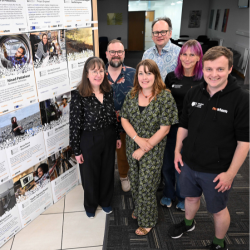-
Study
-
Clearing 2025
- Clearing FAQs
- Clearing VIP
- Clearing Case Studies
- Unlock Your Potential
- Scholarships
- Search Clearing
-
Undergraduate
- UCAS Clearing & Confirmation 2025
- Application Guides
- UCAS Exhibitions
- Foundation Years
- School & College Outreach
- Information for Parents
-
Postgraduate
- Application Guide
- Postgraduate Research Degrees
- Flexible Learning
- Change Direction
- Register your Interest
-
-
International
International
Northumbria’s global footprint touches every continent across the world, through our global partnerships across 17 institutions in 10 countries, to our 277,000 strong alumni community and 150 recruitment partners – we prepare our students for the challenges of tomorrow. Discover more about how to join Northumbria’s global family or our partnerships.
View our Global Footprint-
Quick Links
- Course Search
- Undergraduate Study
- Postgraduate Study
- Information for Parents
- London Campus
- Northumbria Pathway
- Cost of Living
- Sign up for Information
-
International Students
- Information for Students
- International Events
- Application Guide
- Entry Requirements and Education Country Agents
- Global Offices
- English Requirements
- English Language Centre
- International student support
- Cost of Living
-
International Fees and Funding
- International Undergraduate Fees
- International Undergraduate Funding
- International Masters Fees
- International Masters Funding
- International Postgraduate Research Fees
- International Postgraduate Research Funding
-
International Partners
- Agent and Representatives Network
- Global Partnerships
- Global Community
-
International Mobility
- Information for Northumbria Students
- Information for Incoming Exchange Students
-
-
Business
Business
The world is changing faster than ever before. The future is there to be won by organisations who find ways to turn today's possibilities into tomorrows competitive edge. In a connected world, collaboration can be the key to success.
More on our Business Services -
Research
Research
Northumbria is a research-rich, business-focused, professional university with a global reputation for academic quality. We conduct ground-breaking research that is responsive to the science & technology, health & well being, economic and social and arts & cultural needs for the communities
Discover more about our Research-
Quick Links
- Research Peaks of Excellence
- Academic Departments
- Research Staff
- Postgraduate Research Studentships
- Research Events
-
Research at Northumbria
- Interdisciplinary Research Themes
- Research Impact
- REF
- Partners and Collaborators
-
Support for Researchers
- Research and Innovation Services Staff
- Researcher Development and Training
- Research Ethics and Integrity
- University Library
- Vice Chancellors Fellows
-
Research Degrees
- Postgraduate Research Overview
- Doctoral Training Partnerships and Centres
- Academic Departments
-
Research Culture
- Research Culture
- Research Culture Action Plan
- Concordats and Commitments
-
-
About Us
-
About Northumbria
- Our Strategy
- Our Staff
- Place and Partnerships
- Leadership & Governance
- Academic Departments
- University Services
- History of Northumbria
- Contact us
- Online Shop
-
-
Alumni
Alumni
Northumbria University is renowned for the calibre of its business-ready graduates. Our alumni network has over 246,000 graduates based in 178 countries worldwide in a range of sectors, our alumni are making a real impact on the world.
Our Alumni - Work For Us
What will I learn on this module?
1. How strategic recommendations are likely to be evaluated by various stakeholder groups that place a different interpretation on the measurement of business success.
2. Understanding the concepts and frameworks of Endogenous Strategy that apply to a company’s Capabilities, Competences and Resources.
3. How to synthesise key concepts in the Resource-based View of Strategy (RBV) and apply them to companies in competitive markets.
4. How Sustained Competitive Advantage (SCA) can be achieved and maintained in an era of finite resources and increasing demand for sustainability.
5. How Innovation can be managed and applied to Products, Processes, Business Models and Sustainability.
6. How Sustainability can be incorporated into successful Strategy Formulation, Strategic Implementation, and Business Model Innovation.
7. How Leadership impacts upon strategic decision making.
8. Understanding how the concepts of Sustainability and Corporate Social Responsibility can be applied to meet the challenges of Ethical Business Management in the future.
9. How to successfully write compelling and influential strategic briefing documents based around the structure adopted by this module.
How will I learn on this module?
There will be 2 lectures each week, and one seminar (or workshop) every fortnight. Each mode of delivery will require the reading of key material in advance of the session. Working on the assignment will be an academic and experiential process for students leading to their first production of a strategic briefing document. The feedback received from markers will be a key element of the learning cycle.
How will I be supported academically on this module?
Support will be provided to you by a member of academic staff leading the module and providing the majority of lecture input. You will also gain from interaction with a number of other academic staff who will deliver specialist input via workshops and lectures.
This module features Harvard Case Study Workshops. These are interactive two-hour sessions held in the Harvard Suites of CCE1. This is the original “flipped classroom” experience developed by Harvard University Business School in the 1970s. Students will download the designated case from the Harvard Business Publishing Website and conduct their preparatory in-depth analysis prior to the session. Every student will be asked questions and open discussion between students will be facilitated by the member of staff leading the session. These sessions are part of the student’s formative development. Harvard Case Study Teaching can also provide invaluable practice for future recruitment exercises (that you might undertake at an assessment center). The four seminars in this module provide students with formative assistance with the taught analysis techniques and progressively build understanding of the assignment structure.
Your module is supported by an extensive e-learning portal (eLP) which contains lecture and seminar materials and explanation videos of the key concepts. The eLP will also provide links to the electronic reading list that is maintained by the Library. On-going formative assessment is provided by means of eLP self-test quizzes that can help to reinforce your understanding of terminology and concepts.
What will I be expected to read on this module?
All modules at Northumbria include a range of reading materials that students are expected to engage with. Online reading lists (provided after enrolment) give you access to your reading material for your modules. The Library works in partnership with your module tutors to ensure you have access to the material that you need.
What will I be expected to achieve?
Knowledge & Understanding:
MLO-1: Know how leaders and various stakeholder groups measure and appreciate business success.
MLO-2: Understand how to critically evaluate endogenous and exogenous strategy perspectives for a sustainable business environment.
Intellectual / Professional Skills & Abilities:
MLO-3: Develop Desk Research skills in preparing and writing a thoroughly researched and compelling strategic argument for a company.
MLO-4: Ability to critically analyse business strategies and present suitable, feasible, acceptable and sustainable recommendations to business leaders in a succinct manner.
How will I be assessed?
Individual Assessment (100%):
An electronical-submitted written assignment with maximum word limit of 3000 +/- 10% (not including introduction, tables, charts and diagrams). The assignment sectional structure and marking weighting will be as stipulated in the SM9636 Assignment Brief. Assignment will be submitted to the latest version of TurnItIn. The student will choose only one company from a defined short-list issued by the Module Tutor at the end of Week 4 (Lecture No.8).
The assessment is experiential in using synergistic analysis methods (ML0-2) and creating a credible set of strategic options for business leaders (MLO-1, MLO-3 and MLO-4).
NOTE: Only companies on the SM9636 Company List issued for that semester will be allowed as the subject of analysis in the student’s final submission. With the large number of Programmes featuring this core module it is not possible to offer Programme-specific company choices in the short-list. However, the choice will provide a selection of companies giving all students adequate opportunities to deploy the strategic techniques taught on this module. The transferrable skills developed by students on this module can be appreciated in virtually any management career (either as a strategist or a specifier of such services).
Pre-requisite(s)
None.
Co-requisite(s)
None.
Module abstract
If you were asked to conduct an external strategic analysis on a company and then create a compelling set of appropriate strategic recommendations for its leadership; could you do it? This module transfers highly-sought-after graduate level consultancy skills that can be brought to bear in analysis of commercial companies. Here you learn to synthesize the major Resource-based View concepts of Capability, Competence and Resource with Value Chain analysis, and how to deploy these tools to create a strategy for a sustainable and commercially successful future for an organisation. The development of recommendations meeting the generic tests of Acceptability, Suitability, and Feasibility will also require the consideration of Leadership, Stakeholders, Sustainability and Business Ethics. This module prepares the student for structured strategic appreciation in an increasingly complex business environment.
Course info
Credits 20
Level of Study Undergraduate
Mode of Study 4 years Full Time
Location Qatar
City Qatar
Start September
All information is accurate at the time of sharing.
Full time Courses are primarily delivered via on-campus face to face learning but could include elements of online learning. Most courses run as planned and as promoted on our website and via our marketing materials, but if there are any substantial changes (as determined by the Competition and Markets Authority) to a course or there is the potential that course may be withdrawn, we will notify all affected applicants as soon as possible with advice and guidance regarding their options. It is also important to be aware that optional modules listed on course pages may be subject to change depending on uptake numbers each year.
Contact time is subject to increase or decrease in line with possible restrictions imposed by the government or the University in the interest of maintaining the health and safety and wellbeing of students, staff, and visitors if this is deemed necessary in future.
Useful Links
Find out about our distinctive approach at
www.northumbria.ac.uk/exp
Admissions Terms and Conditions
northumbria.ac.uk/terms
Fees and Funding
northumbria.ac.uk/fees
Admissions Policy
northumbria.ac.uk/adpolicy
Admissions Complaints Policy
northumbria.ac.uk/complaints










